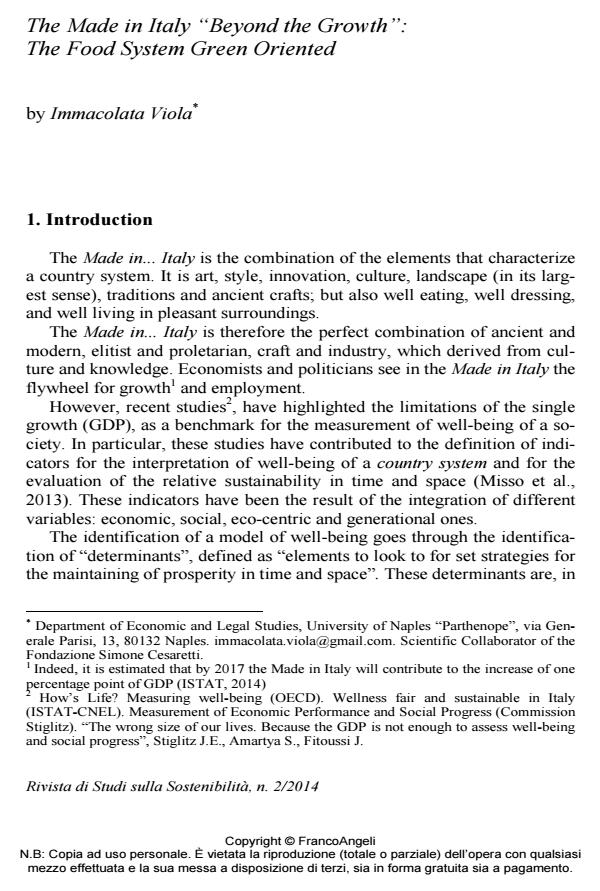Il Made in Italy "oltre la crescita": il food system green oriented
Journal title RIVISTA DI STUDI SULLA SOSTENIBILITA'
Author/s Immacolata Viola
Publishing Year 2014 Issue 2014/2
Language English Pages 14 P. 125-168 File size 184 KB
DOI 10.3280/RISS2014-002008
DOI is like a bar code for intellectual property: to have more infomation
click here
Below, you can see the article first page
If you want to buy this article in PDF format, you can do it, following the instructions to buy download credits

FrancoAngeli is member of Publishers International Linking Association, Inc (PILA), a not-for-profit association which run the CrossRef service enabling links to and from online scholarly content.
The Made in..Italy is considered as a driving force for growth and employment. It is defined as the combination of art, style, innovation, culture, landscape, traditions and ancient crafts. However, we believe that the Made in.. Italy, should take a further responsibilities to go ‘beyond the growth". Does this mean we relate to all of the determinants of well-being; consider the areas of well-being and finally adopt a holistic approach of well-being. In this work, we take care of the Italian Food System and in particular that its component that can be included within the Made in Italy and as one of its orientation green can actually allow the Food System Made in Italy to help give answers in terms of "Sustainability Empowerment".
Keywords: Made in", Made in Italy, well-being, sustainability empowerment, green orientation, agri-food system Italian style
- Global Well-Being Sustainability and Local Development Policies Immacolata Viola, Eva Maria Pfostl, Gavino Nuzzo, in RIVISTA DI STUDI SULLA SOSTENIBILITA' 2/2015 pp.59
DOI: 10.3280/RISS2015-002006 - Life Cycle Assessment and Environmental Sustainability in the Food System Immacolata Viola, Augusto Marinelli, in Agriculture and Agricultural Science Procedia /2016 pp.317
DOI: 10.1016/j.aaspro.2016.02.026 - Towards a Universal Right to Well-being Sustainability Gian Paolo Cesaretti, Maria Carmen de Angelis, Rosa Misso, Aquilina Olleia, Hanna Safwat H. Shakir, in RIVISTA DI STUDI SULLA SOSTENIBILITA' 1/2015 pp.9
DOI: 10.3280/RISS2015-001002
Immacolata Viola, The Made in Italy "Beyond the Growth": The Food System Green Oriented in "RIVISTA DI STUDI SULLA SOSTENIBILITA'" 2/2014, pp 125-168, DOI: 10.3280/RISS2014-002008